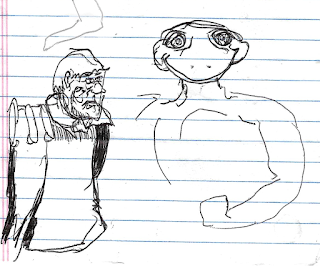I’ve found Icons, one of the latest ttrpg supers game released with some decent popularity, to be completely backwards compatible with the old-as-dirt-old-school supers game DC Heroes. Currently the only copy of this great Mayfair game from the 80’s easily had is the retro-clone from Polaris called The Blood of Heroes. BoH is a complete set of rules which incorporate all the powers and mechanics through DC 3 edition. I like that it is also divorced from the DC Universe, emphasizing the best utility of the game is as your game system used in your own super’s hero universe.
Icons should be noted lends itself to creating your unique
superhero setting. It does this with its character creation process. World building
and super villains are created the same time everyone is making up their random
character. But I’ve used the Icons random character creation method generate
BoH/DC Hero characters. The two systems are so compatible it fits like peanut
butter and jelly.
Interesting, the game Icons bills itself as rather
FATE-adjacent, with its inclusion of Aspects and the use of FUDGE dice, but
really, it is just a recasting of Mayfair’s ground-breaking Exponential Game
System! It also shows these “innovations” FATE’s story-telling system touts as
a new way of playing ttrpg’s with a more player-focused set of rules is not.
Early superhero games like TSR’s Marvel and Mayfair’s DC Heroes had these
player-facing rules and mechanics consciously built into the fabric of these
games. I’m obviously referring to the supers’ genre conceit of heroic flaws,
disadvantages, drawbacks, complications, etc. Every
superhero role playing game at the dawn of the hobby included these character-driven
world building and character-building elements. Really, a new game of Champions,
or Villains & Vigilantes always started players and referee bouncing
ideas off each other and coming up with their various enemies and
power-origins. The act of character creation in any superhero game is
automatically player-gm world building collaboration.
The next reveal this thought experiment of mine gave me is the relationship between the superhero genre and story-game intent. The juice of a superhero game is the soap-opera level drama players get involved with due to their alter-ego and the consequence of ultimate power. I mean SOAP-OPERA, afternoon television over the top back from the dead silly storytelling. And then you get to have a monster fight which wrecks cities!
This isn’t for everyone and running a supers’ game is a good
challenge for Game Masters just on that point alone. It is a refreshing take
from general murder-hoboing and the black and white moralities of the fantasy gaming
realm. Supers’ games, like most games set in a contemporary setting, are NPC-heavy.
A city street is a city street. It is the people who make the place fascinating,
dramatic and filled with tension. The ordinary has to be made extraordinary without
descending into camp. And this is what story games are really about. Spinning
tales of interpersonal conflict in a very soap-opera way.
But back to the conversion method. Really, it is so simple I
just went on the above rant to fill out the post.
Here is how the ICONS attributes translate to MEGS
attributes:
Prowess = Influence
Coordination = Dexterity
Strength = Strength
Intellect = Intelligence
Awareness = Aura and Mind
Willpower = Will and Spirit
Stamina/2 = Body
Stamina is a derived stat in Icons and is a simple
addition of two other attributes. When attributes are added together in BoH’s
it is an increase in one point, not a straight addition. This is because the
system is exponential, each number is twice the value of the number before it.
3 is twice as much as 2.
Now it is just a matter of plugging the Icons values
into the appropriate BoH’s attributes.
Powers work the same way. A Flight of 10 in Icons is a
10 in Flight in BOH. Specialties are Skills. Qualities and Aspects are Drawbacks,
Limitations, Advantages, and Bonuses from old-school BoH. Even resolution is
identical. Both compare an Acting to an Opposing value and establish a degree
of success. The spread of results, from terrible to nothing to exceptional
success, is the same to.
Vehicles work the same way. You can take Icon stats
and use them directly with BoH/DC Heroes rules, no modification!
I don’t have much interest in playing Icons. Blood of Heroes
gives me a denser supers experience and the level of “crunch” and dramatic
roleplay and pace of combat all come together perfectly for me with these
rules. I don’t really much care for ICONS adventure material. I find the
stuff terribly derivative framing of superhero cliches. Buuut, if you
love your game of ICONS you have the whole DC Catalogue of heroes and
villains all in ICONS numbers. Any of these old-school adventures can be
dropped into your Icons campaign world with no mechanical prep
required. The official Icons setting of Stark City and its sourcebook
can be used with any DC Heroes/MEGS campaign you may have. Any of the Icons
third party adventures and books can be used with your MEGS.
So that is really all there is to it. DC Heroes and ICONS
are completely compatible games! It seems Steve Kenson has successfully
traveled from writing a supers game on an old D&D chassis to writing a
supers game on and old DC Heroes chassis and calling it some kind of original
or different take on FATE, FUDGE and story-games is off the mark. The “neat”
things ICONS claims in bullet points on the back of their book are old
achievements by various old school games made a long, long time ago.







